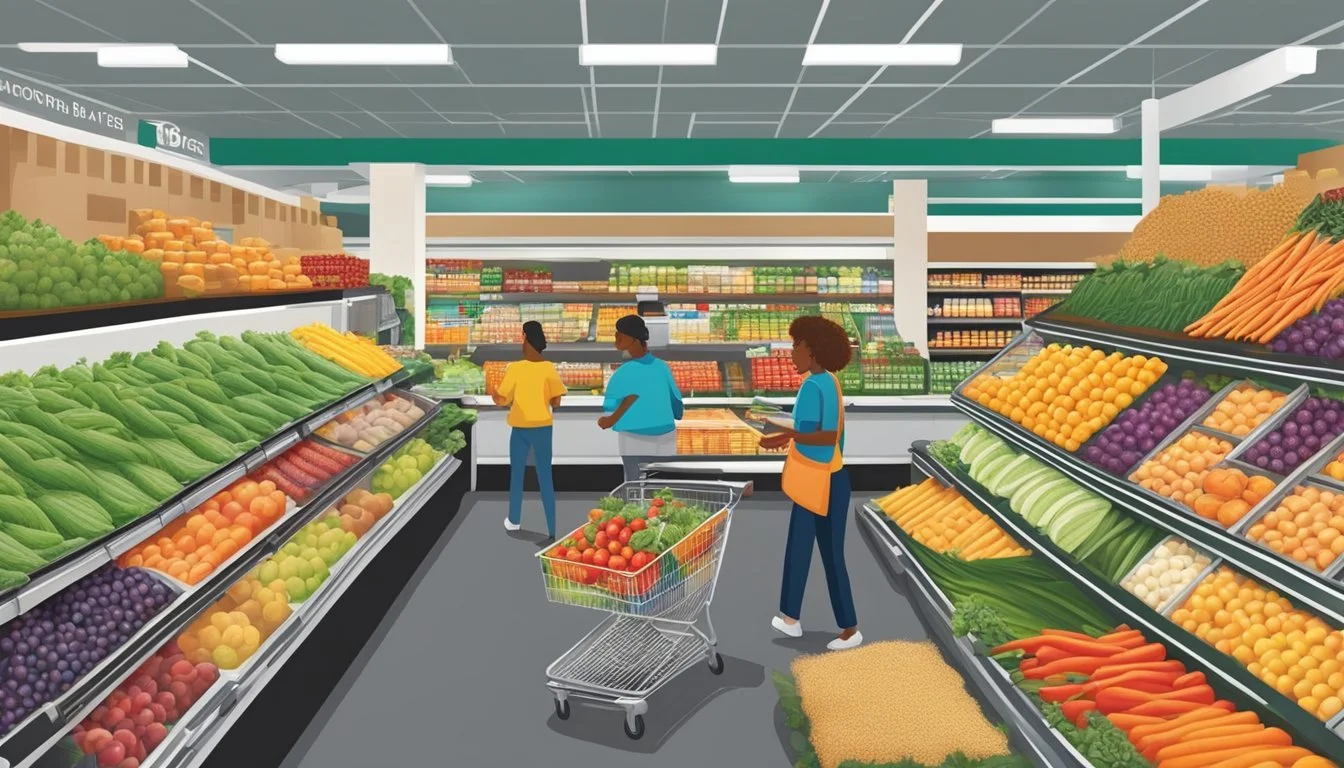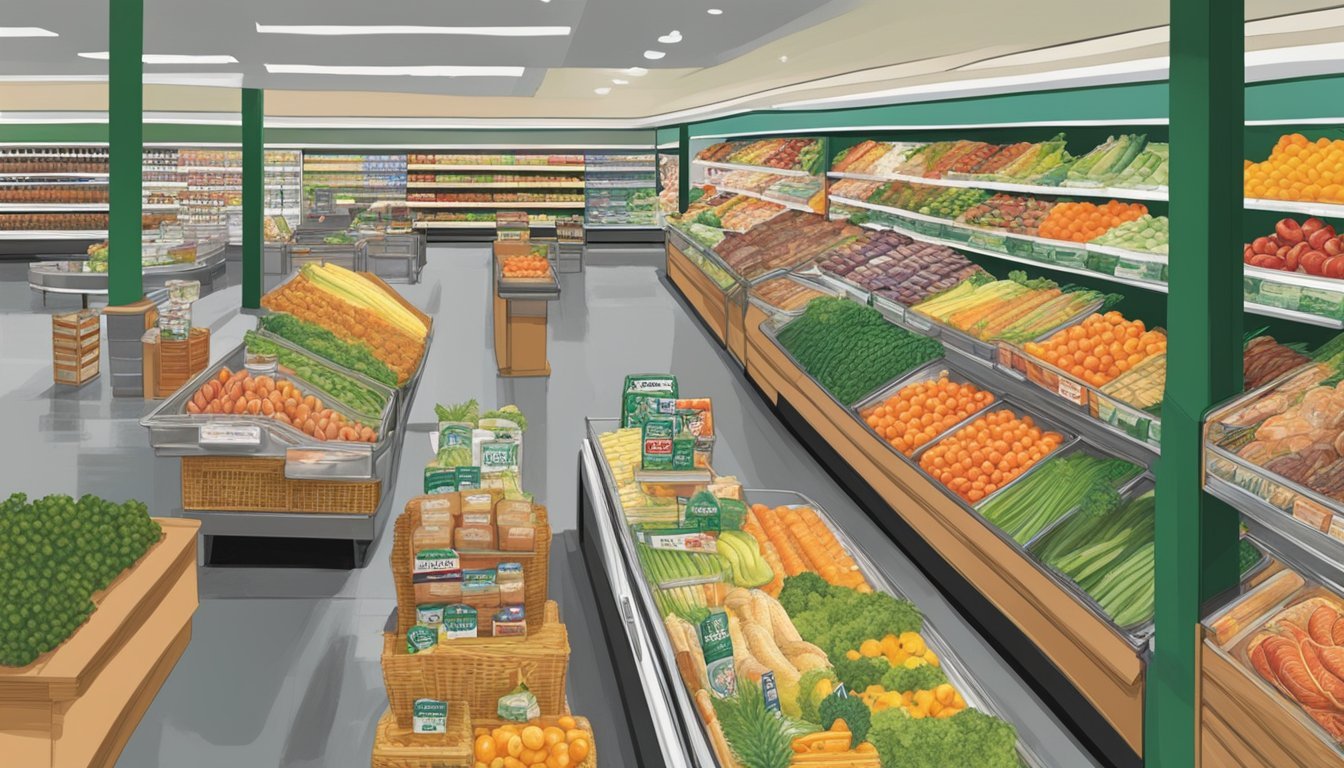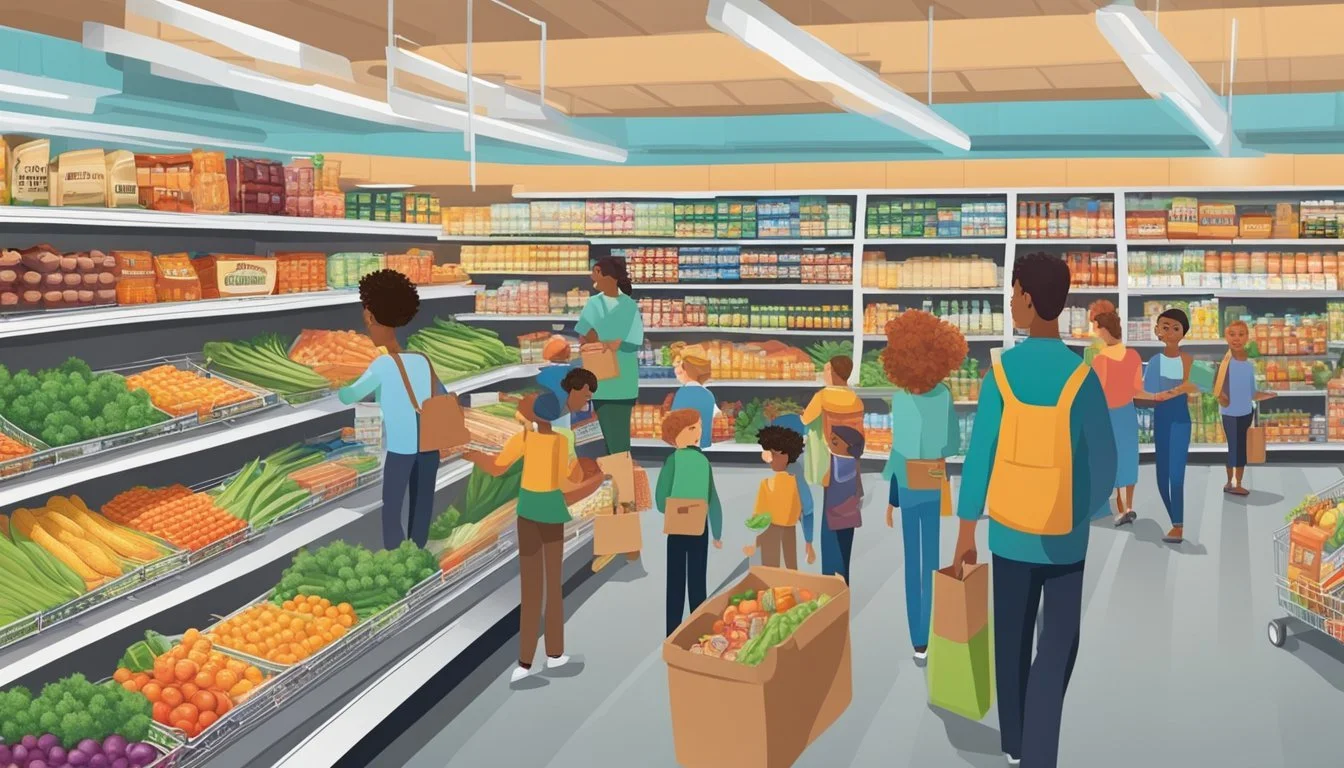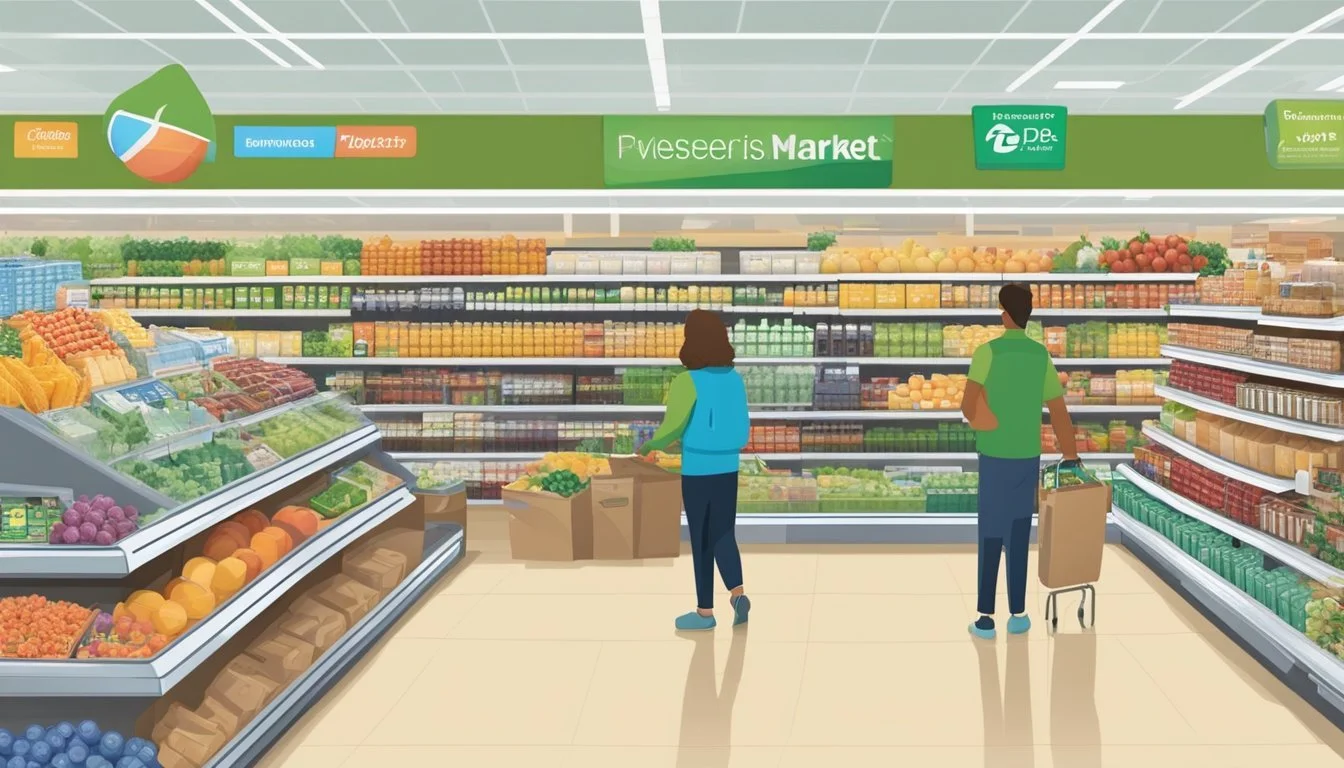Demoulas Market Basket vs Harris Teeter
A Comprehensive Comparison of Price, Quality, and Selection
Demoulas Market Basket and Harris Teeter are two prominent grocery store chains that have carved out distinct niches in different regions of the United States. Market Basket, a New England staple, operates 88 stores across Massachusetts, New Hampshire, and Maine. Harris Teeter, on the other hand, has a strong presence along the East Coast, particularly in the Mid-Atlantic states.
Market Basket offers lower prices and a no-frills shopping experience, while Harris Teeter focuses on a more upscale atmosphere with a wider selection of specialty items. This fundamental difference in approach shapes the shopping experience at each store. Market Basket has built a loyal following in New England, known for its employee-friendly policies and community involvement. Harris Teeter, acquired by Kroger in 2014, has expanded its reach and continues to attract customers with its emphasis on quality and service.
Both chains have their strengths, catering to different customer preferences and regional tastes. Market Basket's roots in Massachusetts contrast with Harris Teeter's expansion from its North Carolina origins. While Market Basket maintains a focus on its core New England market, Harris Teeter has spread along the East Coast, adapting to diverse local markets.
History and Background
The Demoulas Market Basket and Harris Teeter grocery chains have distinct origins rooted in family businesses. Both companies grew from humble beginnings to become significant regional players in the supermarket industry.
Founding and Expansion
Demoulas Market Basket traces its roots to 1917 when Greek immigrants Athanasios ("Arthur") and Efrosini Demoulas opened a small grocery store in Lowell, Massachusetts. The store specialized in fresh lamb and catered to the local Greek community.
In 1954, brothers Telemachus and George Demoulas purchased the original store from their parents for $15,000. They expanded the business rapidly, opening additional locations throughout New England.
Harris Teeter's history began in 1936 when William Thomas Harris opened Harris Super Market in Charlotte, North Carolina. In 1960, Harris partnered with Willis L. Teeter, who operated Teeter's Food Mart. The merger created Harris Teeter Supermarkets.
Key Figures in Company History
Arthur T. Demoulas played a crucial role in Market Basket's development. He became president in 2008 and led the company through a period of growth and modernization.
A family feud erupted in the 1990s when Arthur S. Demoulas accused his cousin Mike of defrauding the company. This conflict culminated in a highly publicized leadership dispute in 2014.
For Harris Teeter, founders W.T. Harris and Willis Teeter were instrumental in the company's early success. Their innovative approach to grocery retail, including introducing the first air-conditioned grocery store in Charlotte, set the stage for future growth.
Ownership and Management
The ownership and management of Demoulas Market Basket have been marked by family disputes and legal battles. These conflicts have shaped the company's structure and operations over the years.
Ownership Disputes and Legal Battles
Arthur T. Demoulas and Arthur S. Demoulas, cousins and grandsons of the company's founder, have been at the center of ownership disputes. In 2014, a major conflict erupted when Arthur S. gained control of the board and ousted Arthur T. as CEO.
This move sparked widespread employee protests and customer boycotts. The nine-week dispute led to $583 million in lost sales and damaged vendor relationships.
The conflict was resolved when Arthur T. and his allies purchased the company for $1.5 billion, regaining control of Market Basket.
Current Management Structure
Arthur T. Demoulas now serves as CEO and president of Market Basket. His leadership style emphasizes employee welfare and customer satisfaction.
The company operates 88 stores across New England, with headquarters in Tewksbury, Massachusetts. Market Basket remains privately held, with ownership concentrated within the Demoulas family.
The management structure prioritizes long-term employee retention and promotion from within. This approach has fostered strong loyalty among staff and customers alike.
Market Basket's value is estimated in the billions, reflecting its strong market position in the competitive grocery industry.
Corporate Philosophy and Business Model
Demoulas Market Basket and Harris Teeter have distinct approaches to their business operations and customer relationships. These philosophies shape their market positioning and financial strategies.
Approach to Customer Experience
Market Basket focuses on a no-frills shopping experience with low prices. They prioritize savings for customers over store aesthetics. Their stores often have basic décor and limited services.
Harris Teeter, in contrast, emphasizes a more upscale shopping environment. They offer a wider range of specialty and organic products. Their stores typically feature modern designs and additional services like in-store pharmacies.
Both chains prioritize customer service, but in different ways. Market Basket is known for its loyal workforce and community-oriented approach. Harris Teeter invests in technology to enhance the shopping experience, including mobile apps and online ordering.
Financial Strategy
Market Basket operates on a high-volume, low-margin model. They keep costs down by limiting advertising and focusing on core grocery items. This allows them to offer consistently low prices.
Their employee profit-sharing program contributes to high worker retention and productivity. Market Basket's financial success relies heavily on customer loyalty and word-of-mouth marketing.
Harris Teeter, owned by Kroger, pursues a more diversified revenue strategy. They generate income from higher-margin specialty items and prepared foods. Their financial model includes partnerships with fuel stations and pharmacies.
Harris Teeter invests more in marketing and store renovations. This approach aims to attract affluent customers willing to pay premium prices for quality and convenience.
Store Offerings and Departments
Market Basket and Harris Teeter both provide extensive product ranges across various departments. Each chain prioritizes quality and sources products to meet diverse customer needs, though their approaches differ in key areas.
Comparison of Product Ranges
Market Basket offers a wide selection of groceries, fresh produce, meats, and dairy products. Their stores typically feature large deli counters, bakeries, and seafood departments. Harris Teeter matches this variety and adds specialized sections like wine and cheese. Both chains carry national brands alongside their own private labels.
Market Basket is known for its competitive pricing on everyday items. Harris Teeter tends to stock more gourmet and specialty products. Both stores offer prepared foods, but Harris Teeter's selection is often more extensive, including hot bars and salad stations.
Quality and Source of Products
Market Basket emphasizes locally sourced produce and meats when possible. The chain works directly with regional farmers and suppliers to ensure freshness. Harris Teeter also prioritizes quality but focuses more on organic and specialty items.
Both stores maintain high standards for their meat and seafood departments. Market Basket is praised for its fresh fish selection, while Harris Teeter offers a wider range of pre-marinated and ready-to-cook options.
In the bakery, Market Basket produces many items in-store daily. Harris Teeter features artisanal breads and custom cake decorating services. Both chains' pharmacies provide standard prescription services, but Harris Teeter often includes wellness clinics and specialized health foods sections.
Pricing Strategies
Demoulas Market Basket and Harris Teeter employ distinct pricing approaches to attract and retain customers. Their strategies encompass various discount programs and overall cost structures that impact shoppers' wallets differently.
Discount and Loyalty Programs
Demoulas Market Basket focuses on everyday low prices without relying heavily on loyalty cards or weekly specials. They maintain consistently competitive pricing across their product range. This approach appeals to budget-conscious shoppers seeking reliable savings without the need to track promotions.
Harris Teeter, in contrast, offers a VIC (Very Important Customer) card program. This loyalty scheme provides cardholders with exclusive discounts and personalized offers. Harris Teeter also runs weekly specials and digital coupons, allowing customers to stack savings for potentially larger discounts on select items.
Both chains occasionally offer bulk purchase discounts, though Market Basket tends to emphasize these more frequently.
Overall Cost Analysis
Market Basket has garnered a reputation for affordability, often beating larger competitors like Walmart on pricing. Their high-volume, low-price model keeps costs down across the board. This strategy has helped them maintain customer loyalty even during periods of inflation.
Harris Teeter generally positions itself as a more upscale grocer, which can result in higher overall prices. However, their promotions and loyalty program can offset some costs for savvy shoppers. A typical grocery bill at Harris Teeter may be about 15% higher than at discount-focused competitors.
For budget-focused consumers, Market Basket often emerges as the more economical choice. Harris Teeter's pricing strategy caters to shoppers who value a mix of quality, variety, and targeted discounts.
Customer Service and Shopping Experience
Demoulas Market Basket and Harris Teeter prioritize customer satisfaction through distinct approaches to service and shopping convenience. Both chains strive to create positive in-store experiences while expanding their digital offerings.
In-store Services
Market Basket emphasizes a no-frills approach with a focus on low prices and efficient service. Their stores feature wide aisles and well-stocked shelves to facilitate easy shopping. Cashiers are known for their speed and friendliness.
Harris Teeter offers a more upscale experience with additional amenities. Many locations include pharmacies, floral departments, and wine consultants. The chain's commitment to customer service is evident in their "100% Satisfaction Guarantee" policy.
Both stores provide grocery carryout services. Harris Teeter also offers a fuel points program at select locations, allowing customers to save on gas purchases.
Online and Digital Initiatives
Harris Teeter leads in digital innovation with its e-VIC loyalty program. Members receive personalized coupons and can load digital offers directly to their VIC card. The chain also offers online ordering with ExpressLane pickup and home delivery options.
Market Basket has been slower to adopt digital technologies. However, they recently launched an app for digital coupons and weekly circulars. Online ordering is available in select locations, though not as widespread as Harris Teeter's offerings.
Both chains maintain active social media presences to engage with customers and share promotions. Harris Teeter's more robust digital ecosystem provides greater convenience for tech-savvy shoppers.
Community Involvement and Public Perception
Demoulas Market Basket and Harris Teeter have cultivated strong community ties and positive public images through their actions and policies. Both chains prioritize customer satisfaction and local engagement, though their approaches differ.
Brand Loyalty and Consumer Advocacy
Demoulas Market Basket enjoys exceptional brand loyalty. This was dramatically demonstrated in 2014 when employees and customers united to protest the firing of CEO Arthur T. Demoulas. The protests led to a six-week boycott that nearly brought the company to a standstill.
Shoppers and workers rallied together, demanding the reinstatement of their beloved leader. This unprecedented show of support highlighted the deep connection between Market Basket and its community.
Harris Teeter, while not experiencing such dramatic events, has built a loyal customer base through consistent service and quality products. The chain's focus on fresh produce and premium offerings has cultivated a dedicated following in its operating regions.
Corporate Social Responsibility
Both grocery chains actively engage in corporate social responsibility initiatives. Market Basket is known for its employee-friendly policies, including profit-sharing and internal promotion opportunities. These practices have fostered a dedicated workforce and positive public perception.
Harris Teeter emphasizes community involvement through various programs. The chain supports local food banks, sponsors youth sports teams, and participates in environmental sustainability efforts.
Both companies prioritize local sourcing, supporting regional farmers and producers. This approach not only ensures fresher products but also strengthens ties with local communities.
Comparative Market Performance
Market Basket and Harris Teeter have distinct financial profiles and market positions that impact their overall performance. Their revenue, assets, and growth strategies differ significantly.
Financial Health and Growth
Market Basket operates as a privately held company, making detailed financial information less accessible. The chain has maintained a reputation for low prices and customer loyalty. Its financial strategy focuses on cost control and efficient operations.
Harris Teeter, as a subsidiary of Kroger since 2014, benefits from the financial backing of a larger corporation. This arrangement provides Harris Teeter with increased resources for growth and expansion.
Kroger's 2022 annual report showed strong performance across its brands, including Harris Teeter. The company reported total sales of $137.9 billion and net earnings of $1.6 billion.
Market Presence and Expansion Potential
Market Basket has a strong regional presence in the northeastern United States. The company operates over 80 stores across Massachusetts, New Hampshire, and Maine. Its expansion has been cautious and focused on its core market area.
Harris Teeter has a wider geographic footprint. The chain operates over 260 stores and 60 fuel centers across seven states and the District of Columbia. This broader presence gives Harris Teeter more diverse market exposure.
Harris Teeter's integration with Kroger provides opportunities for shared resources and technology. This advantage could accelerate future expansion efforts and improve operational efficiency.
Both chains face competition from larger national players like Whole Foods and regional competitors. Their ability to maintain market share depends on adapting to changing consumer preferences and retail trends.
Legal and Ethical Considerations
Demoulas Market Basket and Harris Teeter have faced legal challenges and ethical scrutiny over the years. Their approaches to business practices and employee relations have drawn attention from regulators and the public.
Notable Lawsuits and Legal Issues
Demoulas Market Basket endured a high-profile family feud that spilled into the courts. In 1994, members of the Demoulas family sued each other over ownership stakes. The legal battle lasted decades, culminating in a 2014 employee walkout and customer boycott.
Harris Teeter has faced its own legal challenges. In 2016, the company settled a class-action lawsuit over alleged violations of the Fair Credit Reporting Act. The suit claimed Harris Teeter failed to properly disclose background check information to job applicants.
Both chains have dealt with real estate disputes. Market Basket's expansion plans sometimes met local opposition, leading to zoning battles. Harris Teeter has navigated similar issues in its southeastern markets.
Ethical Business Practices
Market Basket gained praise for its employee-centric culture. The company offers profit-sharing and above-average wages. During the 2014 crisis, workers risked their jobs to support ousted CEO Arthur T. Demoulas, citing his ethical leadership.
Harris Teeter emphasizes community involvement and sustainability. The chain partners with local food banks and has implemented energy-saving measures in stores. It also focuses on sourcing products from local suppliers.
Both companies provide healthcare benefits to employees, though coverage details vary. Market Basket's generous benefits became a focal point during its ownership dispute. Harris Teeter, as part of Kroger, offers a range of health plans to eligible workers.
Future Trends and Industry Projections
Grocery retail is undergoing rapid transformation driven by technology and changing consumer preferences. Innovations in artificial intelligence and automation are reshaping operations, while competitive pressures push chains to evolve their strategies.
Innovations in Grocery Retail
AI and automation are revolutionizing the grocery industry. Market Basket and Harris Teeter are likely to implement AI-powered personalization for targeted promotions and product recommendations. Self-checkout kiosks and robotic shelf-scanning may become more prevalent in both chains.
Grocery delivery and curbside pickup services will continue expanding. Harris Teeter, backed by Kroger, may leverage advanced logistics networks. Market Basket could partner with third-party delivery platforms to enhance its omnichannel presence.
Data analytics will play a crucial role in inventory management and pricing strategies. Both retailers may invest in predictive algorithms to optimize stock levels and reduce waste.
Projections for Competitive Growth
Market Basket's focus on low prices and customer loyalty positions it well for continued growth in price-sensitive markets. Its no-frills approach may resonate with budget-conscious shoppers amid economic uncertainties.
Harris Teeter, with Kroger's resources, is poised to expand its organic and premium offerings. It may invest in private-label products to compete with Whole Foods and Amazon's grocery initiatives.
Both chains will likely face increased competition from online retailers. To counter this, they may enhance their in-store experiences with cooking demonstrations, wine tastings, or community events.
Consolidation in the grocery sector could impact both companies. Harris Teeter, as part of Kroger, may benefit from economies of scale. Market Basket might consider strategic partnerships to maintain its competitive edge.












